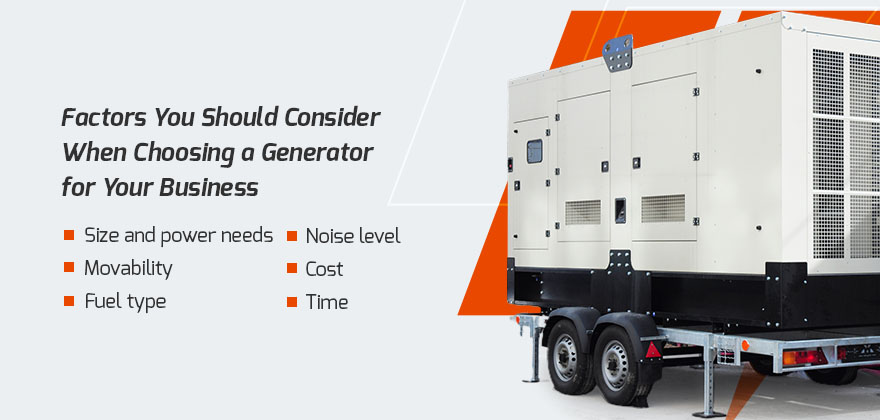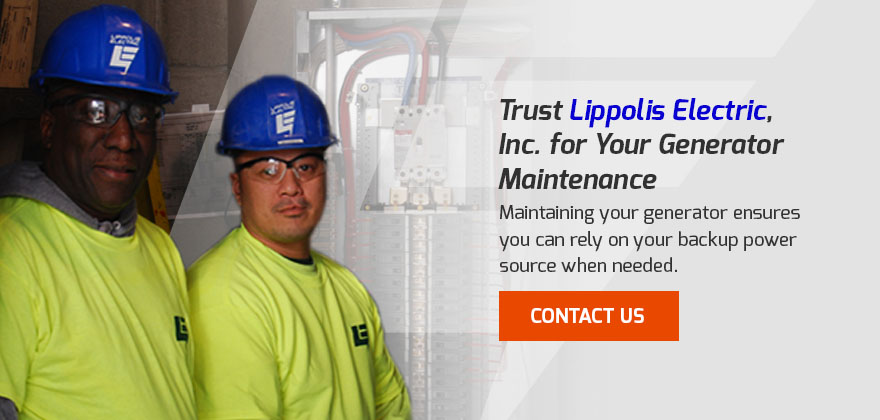Commercial Generator Buyer’s Guide

During a power outage, your business could lose money, regardless of the industry you’re in. Your equipment can also become damaged, and you could lose essential data.
Having reliable backup power is essential for commercial businesses. Generators are an excellent way to supply your business with backup power so you can stay operational until the grid is up and running.
Learn how to choose a generator for your business and why it matters below.
Table of Contents
- What Is a Commercial Generator and How Does It Work?
- Types of Commercial Generators
- How Do You Choose a Generator for Your Business?
- What Are the Risks of Generator Power Failures?
- Trust Lippolis Electric, Inc. for Your Generator Maintenance
What Is a Commercial Generator and How Does It Work?
Commercial generators help provide power to a business or industry during a power outage. Typically, businesses install these machines outside, and the generator turns on automatically once it senses a loss of power. These generators generally operate in three phases, as they support a more significant electrical demand than residential generators.
Most commercial generators have an automatic voltage regulator, allowing for voltage control and minimizing surges and power dips. These large generators are ideal for hospitals, health care facilities, retail stores and other businesses that rely on a consistent power supply to stay operational. Generator power may be essential for some businesses, such as those in the health care industry, to supply power to life-saving equipment.
A professional job site generator works through electromagnetic induction, which converts mechanical energy into electrical energy. The first step or phase is the engine creating motion, or mechanical energy. This mechanical energy generates electrical charges, and a conductor pushes these charges through a magnetic field. In the final phase, the mechanical energy is converted into an electrical current, which businesses can use to power various items.
Types of Commercial Generators
The fuel type is one of the most significant distinguishing factors between commercial generators. Some of the types of generators for businesses include:
- Natural gas generators: These generators run on natural gas, which is ideal if you have a natural gas line for your business. You won’t have to worry about storing fuel on-site, and it’s readily available as soon as you need fuel for your generator.
- Diesel generators: Diesel is one of the most popular fuel types because it runs efficiently and is readily available. These generators are also some of the most affordable to run and maintain, making them a cost-effective choice. Diesel generators also have excellent power capabilities, allowing businesses to power some major operations while waiting for power restoration.
- Propane generators: Propane has an unlimited shelf life, but it’s one of the most expensive options for generator fuel compared to other choices, including storage expenses. One of the benefits of these generators is that they’re quieter to run, though they use more fuel than diesel generators.
- Dual fuel generators: You can also choose generators that run on diesel and natural gas, allowing you to use a backup fuel source to ensure you don’t lose power during an outage. Once you run out of one fuel source, another kicks in to provide continuous power.
How Do You Choose a Generator for Your Business?

Having backup power is essential for any business, but how do you choose the generator? There are several factors you should consider when choosing a generator for your business, including the following:
- Size and power needs: Knowing how to size a commercial generator for a building can help you choose the right generator. Look into what you’ll need to power continuously during an outage and select a generator that can safely supply the energy you need. You can decide between single or three-phase generators, depending on whether you’re a small or large business.
- Movability: Some businesses need their generators to be portable, while others are fine with a stationary generator. For example, you may use generators at a construction site and need to move them as you complete different phases of your project. Alternatively, your business may operate out of one building, and a stationary generator is all you need to supply reliable backup power to your business in an outage.
- Fuel type: Another factor you’ll need to consider is what fuel type you want to use. For example, you may want to use natural gas if you already have natural gas lines running for your business. You may choose other fuel types, such as diesel or propane, depending on your power requirements, availability and other factors.
- Noise level: Many generators are located outside a business, but these machines can still make considerable noise. You may have a business in an area with a noise ordinance, or you may not want to disturb your customers or clients. Some models make more noise than others, though you may be able to purchase a high-grade muffler to significantly reduce the noise.
- Cost: One of the more important factors businesses consider before choosing a commercial generator is cost. Business owners should remember that losing power can cost significant revenue, which should be factored in when deciding how much to spend on a generator. These machines are invaluable during an outage, so it pays to invest in one that fully meets your needs and can hold up over time.
- Time: Another factor you should think about is how long your generator will need to run. Some generators can provide a few hours of run time, while some can run 24/7 with a steady fuel supply. You’ll want to find a generator that covers most emergency outages that can span a few weeks.
What Are the Risks of Generator Power Failures?
Power outages or failures can create numerous problems for your business, including lost revenue, unexpected downtime, damaged equipment and lost data, to name a few. These effects can have negative consequences for your business, so it’s essential to have a backup power source to help you stay operational during a power outage.
Understanding how a power failure can occur with your generator can also help you prevent it from happening, allowing you to maintain a steady power supply.
Some of the causes or risks of generator power failure include:
- Wet-stacking: When generators sit idle for long periods, it can cause soot and unburned fuel to build up in the exhaust system, referred to as wet-stacking. If your generator experiences this problem, it likely won’t perform at its maximum capacity and could fail when you need it most. You can perform regular load bank testing to prevent wet stacking so your generator maintains reliability.
- Empty fuel tanks or low-quality fuel: A generator needs high-quality fuel to perform correctly. If you have an empty fuel tank or low-quality fuel left sitting for long periods, it could cause a generator failure, making it challenging to obtain backup power during an outage. It’s essential to routinely check the fuel quality and levels to ensure your generator is reliable during an outage.
- Coolant or fuel leaks: Generators that sit idle for long periods risk coolant or fuel leaks, which can risk dangerously low levels that can render your generator unusable until the problem is fixed. If you don’t notice a leak until you need emergency power, you could experience downtime, lost revenue and other detrimental effects. It’s essential to test your fuel and load bank regularly to ensure no leaks.
- Neglected maintenance: One of the most common reasons generators fail is neglected maintenance. If your generator isn’t maintained, it could fail during a power outage, rendering your business inoperable. It’s critical to schedule regular maintenance to sustain the health of your backup generator and to notice problems before they become critical issues.

Trust Lippolis Electric, Inc. for Your Generator Maintenance
Having backup power is essential for the success of your business during an outage. Maintaining your generator ensures you can rely on your backup power source when needed. Lippolis Electric, Inc. is here to help you with our commercial maintenance and repair services. We can provide emergency services to ensure you stay in power during an outage.
We have years of experience providing reliable service to various industries. Our technicians are highly trained, ensuring you get the best service. Contact us today to learn more about how we can help you establish a reliable power supply for unexpected outages.
Schedule service
Please note that your appointment is not set until confirmed by Lippolis Electric shortly after you've submitted the form.
| ‹ | › | |||||
| Sun | Mon | Tue | Wed | Thu | Fri | Sat |

